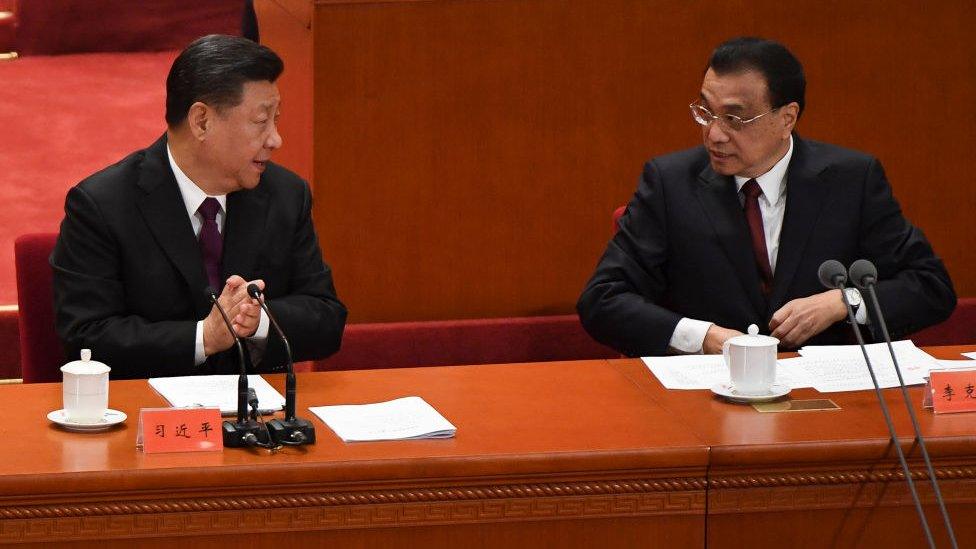Erkin Tuniyaz: UK MPs urge government to block Xinjiang official's trip
- Published
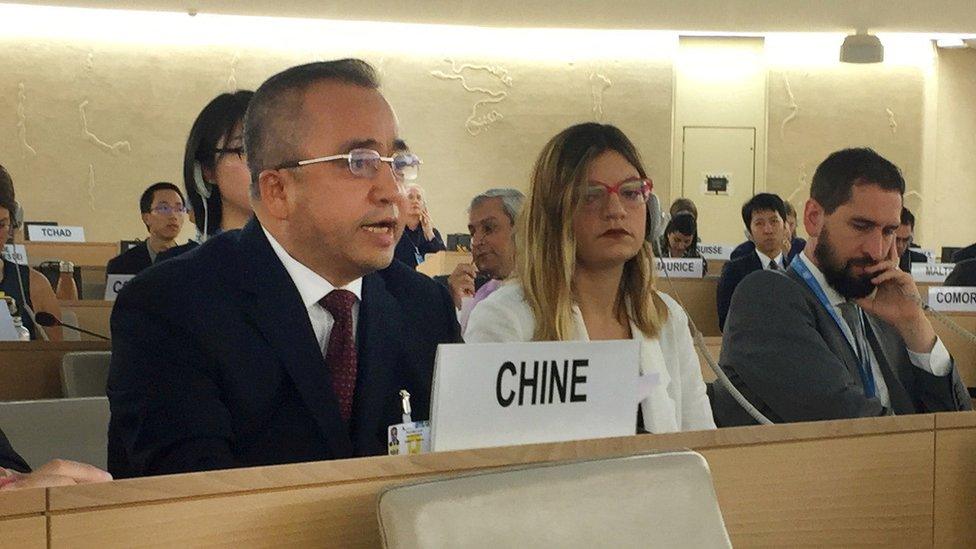
Mr Tuniyaz (left), seen in this file picture from 2019, is the governor of Xinjiang province
A cross-party group of MPs are urging the government to block a planned visit to the UK by a senior Chinese official accused of overseeing severe human rights violations in Xinjiang.
If the trip goes ahead, the MPs argue, a private prosecution should be allowed to be brought against him. One even suggested the Chinese official should be arrested.
Erkin Tuniyaz is a top-level Chinese Communist Party member and the governor of China's north-western Xinjiang Province. In 2021 MPs approved a non-binding Commons motion which declared Uyghur Muslims and other minorities in Xinjiang were "suffering crimes against humanity and genocide".
On Thursday in the Commons, MPs voiced their outrage after the government said Mr Tuniyaz might arrive in the UK at the weekend and have a meeting with Foreign Office officials next week.
The United Nations has accused China of "serious human rights violations" and possible crimes against humanity in Xinjiang. Human rights groups believe more than one million Uyghurs and other ethnic minorities have been detained in camps.
China denies it's committed abuses in Xinjiang, and says the camps are "learning facilities" intended for deradicalisation.
Seven MPs have signed a letter to Attorney General Victoria Prentis asking her to give "serious consideration" to a request to approve a private prosecution of Mr Tuniyaz.
Lawyers for Erbakit Ortaby, an ethnic Kazakh who now lives in the UK, say they lodged the request this week.
Mr Ortabay claims he was detained in one of a "network of internment camps" China has constructed in Xinjiang. He alleges he was arbitrarily detained for several months, experienced forced labour, and was subjected to torture.
His legal team say Erkin Tuniyaz, as the governor of Xinjiang, is not entitled to diplomatic immunity because he holds a position of "state responsibility" and was "directly responsible for the implementation of policies designed to restrict the basic rights and freedoms of Uyghur people".
They say torture is a "universal jurisdiction" offence that can be prosecuted in any country, but the attorney general must approve it.
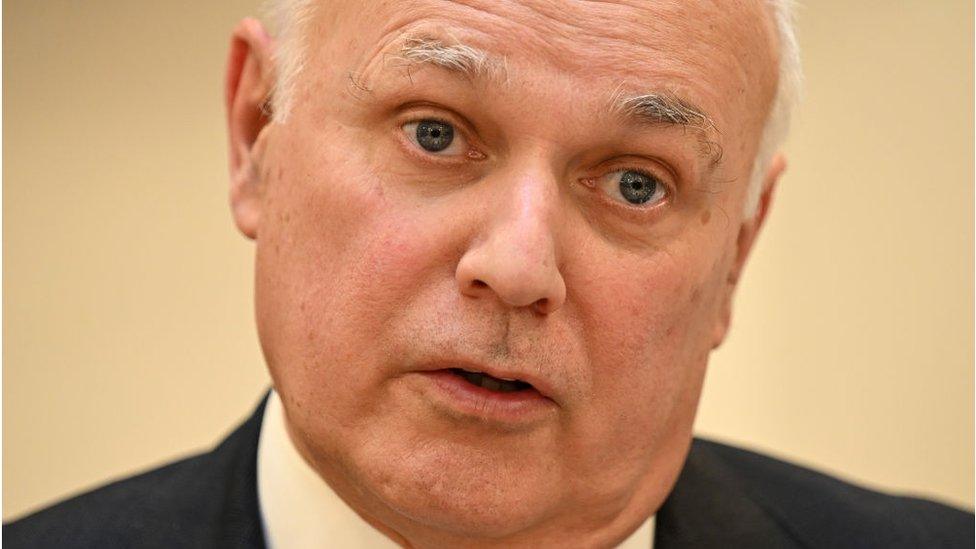
Sir Iain Duncan Smith is among the seven MPs who have signed the letter
The seven MPs, who include Sir Iain Duncan Smith, Chris Bryant and Alistair Carmichael, say in their letter to Victoria Prentice they understand "evidence has been submitted" to the Metropolitan Police's War Crimes Team "for investigation and possible action when [Mr Tuniyaz] arrives on Sunday".
They add "we hope you will give this application serious consideration. In the absence of an international mechanism to hold to account those responsible for Uyghur abuses, we must seize every opportunity to ensure accountability".
The attorney general's office has been approached for comment.
Earlier, in the Commons, Foreign Office Minister Leo Docherty was heckled by Tory MPs as he explained Mr Tuniyaz may travel on a diplomatic passport and so could not be denied entry as he has not been sanctioned by the UK.
Mr Docherty said: "He has not been invited by the UK government or by the FCDO [Foreign Commonwealth and Development Office] and we have no confirmation that he will in fact travel."
He said ministers would not meet Mr Tuniyaz but had approved a meeting with Foreign Office officials as part of a policy he described as "robust pragmatism" to ensure continued dialogue with China.
"The judgment of ministers has been that these opportunities are useful in their ability to offer a chance to express a very forthright condemnation of the outrages in Xinjiang."
The Conservative MP Iain Duncan-Smith called that a "weak response."
He said Mr Tuniyaz, who had overseen the internment of over a million people, was "hardly likely to be bothered by a Foreign Office official telling him 'now, now you've got to stop this.'" A meeting with UK officials would, he said, be "a propaganda coup for the Chinese government".
Mr Duncan-Smith called on the government to sanction Mr Tuniyaz, and said the UK had sanctioned "only three rather junior people," comparing it to the US which had "107 punitive sanctions" including 10 sanctions on individuals including Erkin Tuniyaz.
"The place to deal with these individuals is in a tribunal or a court of law, not in the quiet office of a Foreign Office official," he said.
Alicia Kearns, another Tory, who chairs the Foreign Affairs Select Committee, said the government's response was "simply not good enough".
She said: "In Xinjiang women are being forcibly sterilised, children are in concentration camps, there are forced labour camps and systemic rape, yet the minister has just confirmed from the despatch box that ministers approved of this visit by one of the masterminds of this genocide."
"There is no legitimate reason to allow this man, Erkin Tuniyaz, into our country, [the] only meetings with him should be in a courtroom. So will the government now sanction him?"
And when another Conservative MP Bob Blackman said he understood an application had been made to the attorney general for permission for Mr Tuniyaz "to be arrested on arrival", Ms Kearns raised her voice to say "deny the visa or arrest him."
The prime minister's official spokesman told journalists: "My understanding is that FCDO officials are meeting the governor of Xinjiang to make clear the UK's abhorrence over the treatment of the Uyghur people and to underline that we will not relent from exposing the horrors from which they are being subjected."
Related topics
- Published24 May 2022
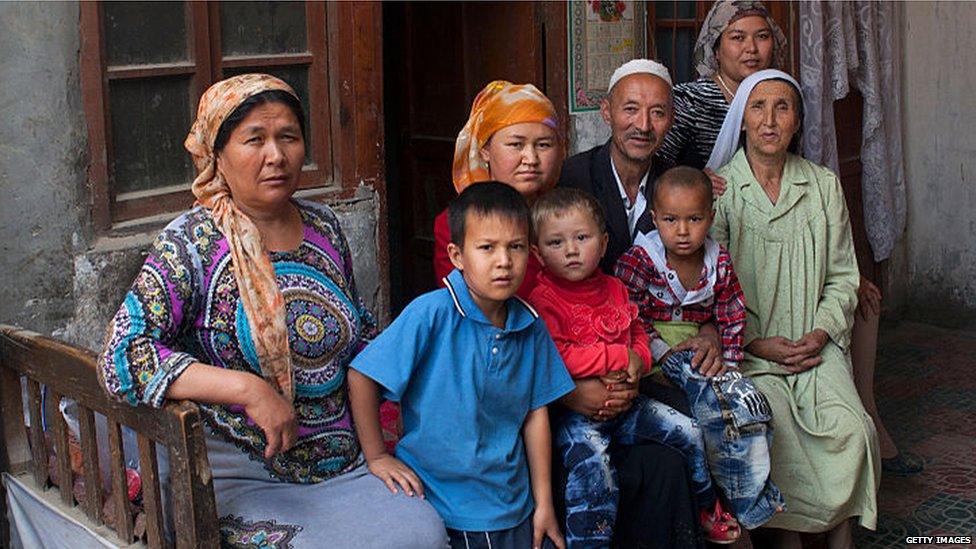
- Published1 September 2022
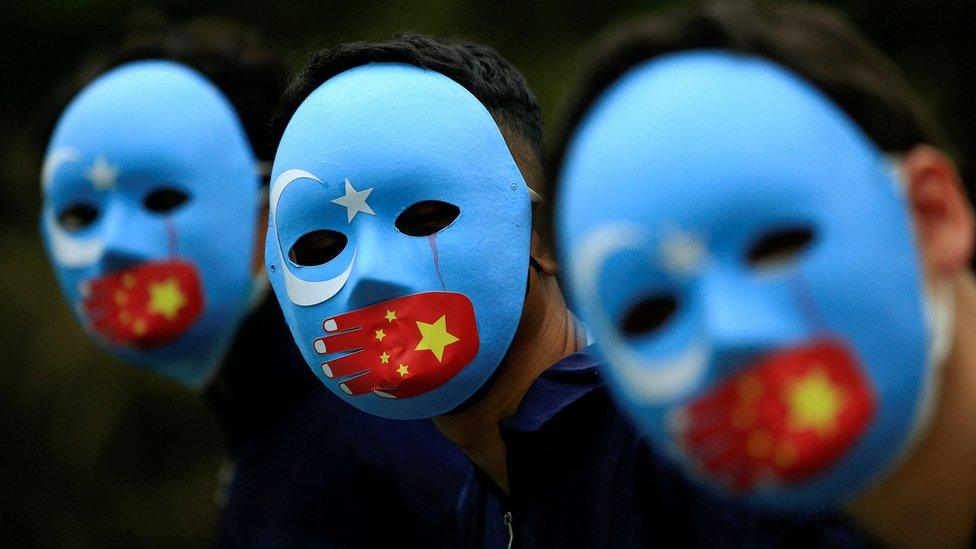
- Published30 November 2021
